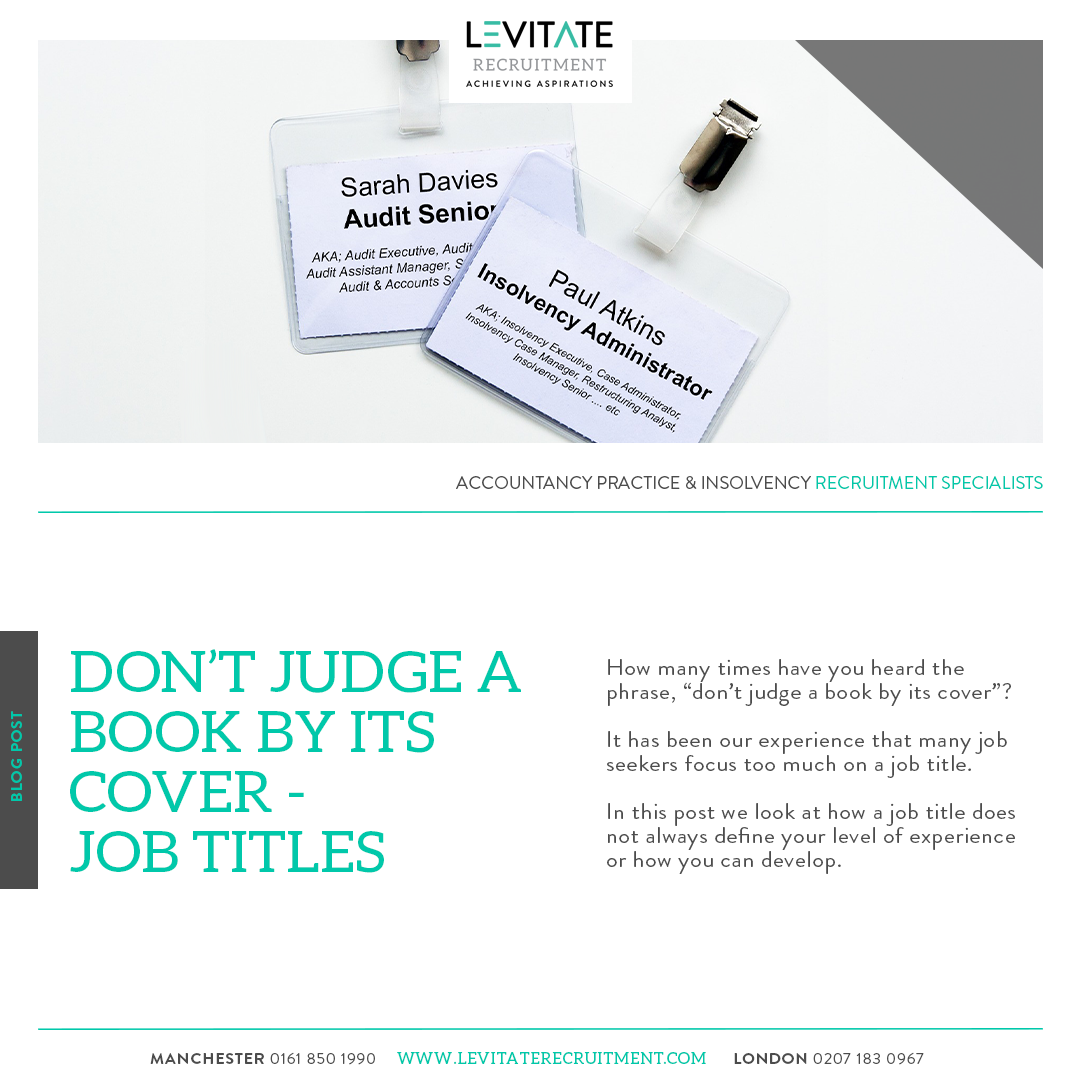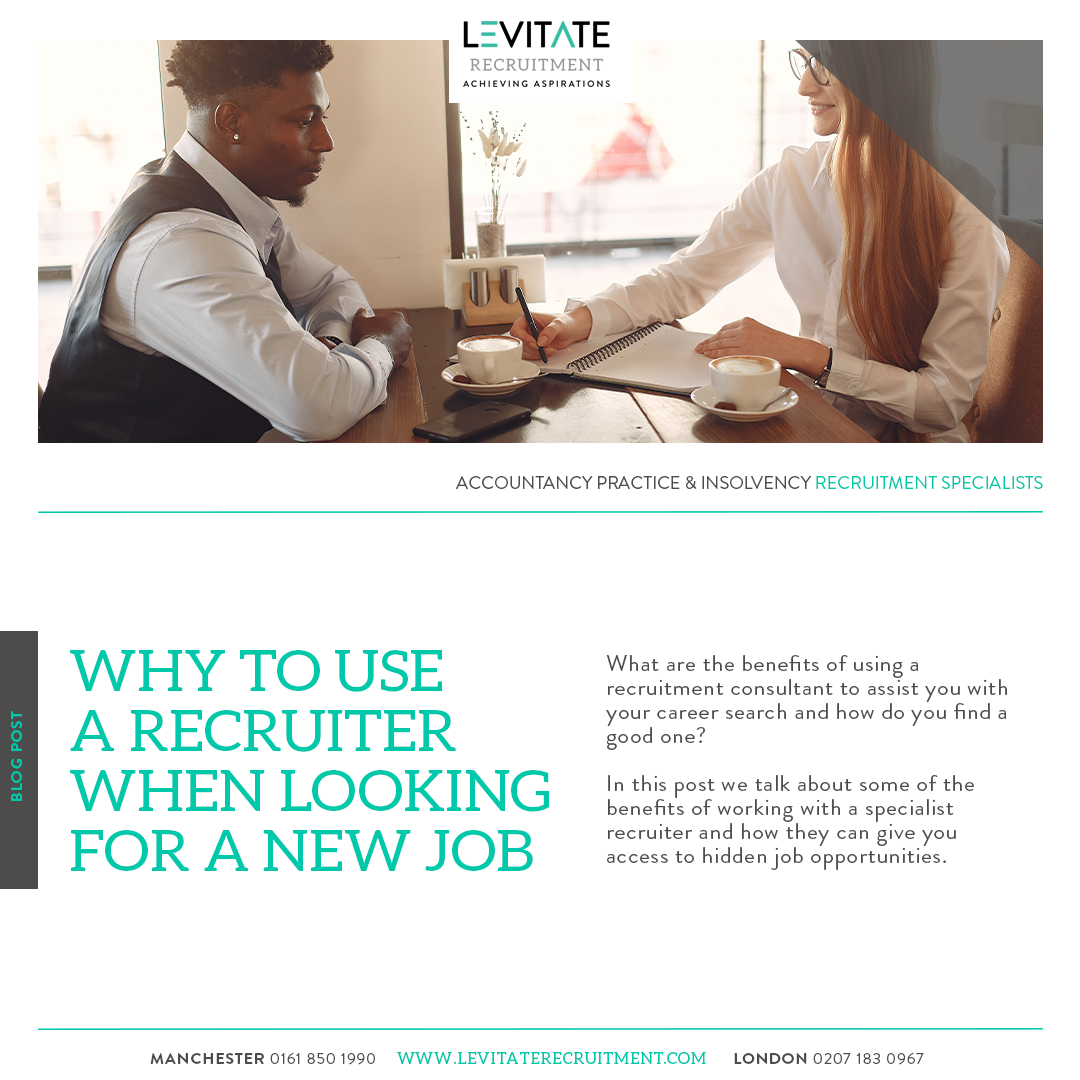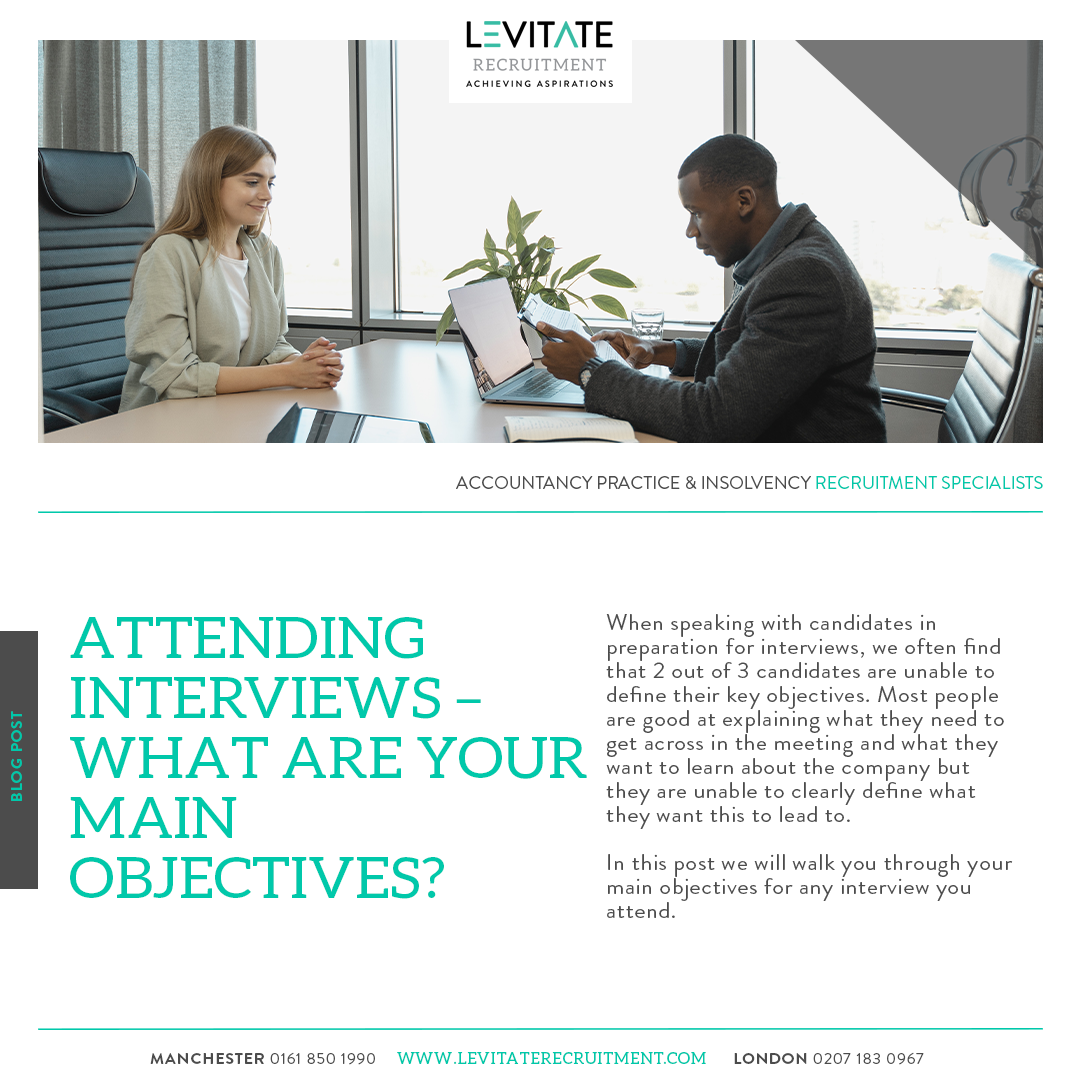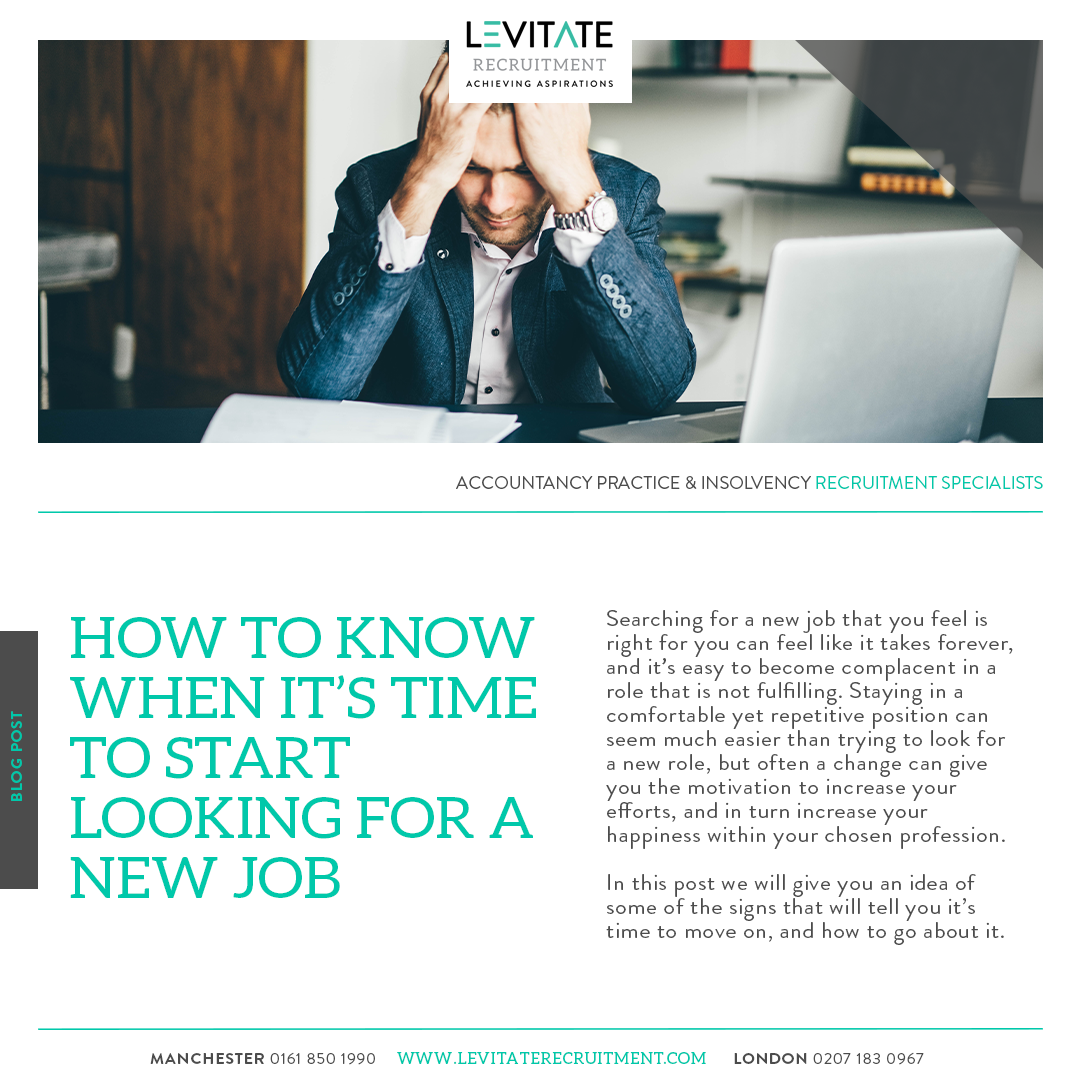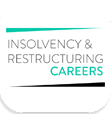What are the benefits of using a recruitment consultant to assist you with your career search and how do you find a good one?
Comments I often hear from people I speak with for the first time include; ‘I’ve had a bad experience with recruitment consultants’ or ‘I’ve heard bad things about recruiters. This on occasion can lead to the conversation being cut short by the individual.
We’ve all had or heard of bad experiences when eating out, however, the bad taste it leaves doesn’t stop us from using a restaurant again, we may however decide not to consider that particular establishment! As in life; there is always good and bad, so don’t let the bad stop you from being open to benefiting from working with a recruiter that is very good at what they do and one that can assist you in achieving your aspirations.
How do you know what you could be potentially missing out on until you listen?
Recruitment strategy is very different across each industry sector so it is important to try and gain a good understanding of market drivers. The Insolvency and Accountancy practice markets are typically candidate led markets rather than job led. This means that potential opportunities are focussed more on an individual’s experience and if they can add value rather than a specific recruitment need or advertised opportunity. Over the last 12 months, more than 70% of the people we assisted at Levitate Recruitment have found new job opportunities with companies that didn’t have a specific job advert posted.
As a specialist Insolvency and Accountancy practice recruiter, I can only offer my views on the benefits of using a recruiter if you are looking for an opportunity in Insolvency and Accountancy Practice. If you are looking for a role in commerce and industry or another sector, some but not all may be applicable.
What are the benefits of using a Recruitment Consultant to assist you with your career search and how do you find a good one?
It’s free!
Using a recruitment consultant is free to the job seeker. Recruitment consultants are paid by companies to find suitable staff for their firm, so they are motivated to assist you in securing the right career opportunity.
A recruitment specialist in your industry
A recruitment consultant should know how the recruitment market works within your specialism. As a specialist, they will be able to talk to you about the career paths open to you based on your current experience. They will be able to listen to your aspirations and advise you on how viable they are now or in the future and inform you of the exposure/experience you need to develop to put yourself in the best position to achieve them in the future.
A specialist recruiter will have a wide range of case studies of other professionals that they have assisted and critical information directly from a hiring manager as to what they are looking for and the key skills you will need to demonstrate.
They will be able to advise you on firms that they think will be a good fit for you and will also be able to back it up with valid reasons.
CV Advice and Interview Preparation
CV Advice
It is often difficult to put down on paper what you do on a day to day basis and if it is your first time writing a professional CV, most are not sure where to start. If you do a quick google search, you will have hundreds of results telling you differing things.
Again, a specialist within your market will be able to advise you of the typical information that clients look for when they review a CV. Recruitment consultants review hundreds of CVs a week and a good recruitment consultant will know how to demonstrate your experience effectively. Your CV is your advert and it is critical that whoever reads it (be it a Partner or HR professional) is left in no doubt how strong of a prospect you are.
CVs are also used as an interview tool by clients and they will be referred to throughout the meeting. Ensuring that your CV is structured appropriately with the right information will assist this process.
Interview Preparation
Whether you are confident with interviews or not a Recruitment Consultant will be able to provide you with some specific guidance on your interview. They may not be able to tell you every single question that will be asked but they will be able to advise you on the type of people the firm/Partner typically looks for and the skills they would like for you to demonstrate. They should also have some idea of the types of questions the firm typically asks.
A common question I often get told is of concern is how to answer the weakness question, see my previous post The ‘Weakness’ Question.
A good recruiter should have the ability to assist you in interview preparation so that you are on your front foot always and in a position where it doesn’t matter what question is thrown your way, as you will be well prepared to deal with it.
They are your biggest fan!
Your CV can only say so much, your Recruitment Consultant is there to promote you to potential employers. They can tell the client why you would be a good fit for them, why it would be a good idea to meet you for a coffee and ultimately advise them on market conditions so that they learn to value each candidate they meet as a potential prospect that can add value to their firm. They should know what certain partners look for in potential hires and if that is you, they can unlock potential opportunities that are not being advertised.
A good recruiter will also be able to counteract and alleviate any potential concerns over what’s written in your CV. Have you had a few moves on your CV, have you only been in your role for 6 months but are already looking again? Rather than allowing the client to make assumptions and potentially rule you out, your consultant can advise the client why you are considering your options and broker the information in a more effective way.
They are your protector/buffer
Partners and HR Managers receive an unbelievable number of CVs each week and it takes time for them to sift through the rubbish to find the gems. A recruitment consultant can chase up on a CV and again highlight why they should be meeting you.
You’ve come out of an interview and thought you could have provided a different answer or given more information, your recruitment consultant has the chance to put this to the interviewer. If the interviewer has any reservations as to your suitability your recruiter can try to counteract these.
If you are in a time precious situation as you already have an offer on the table and you don’t want to miss out on the offer or other options to compare, your recruiter can apply a certain amount of pressure on the client to speed the process up so that you get to fully consider your options.
They have access to a wide range of job opportunities (both live and potential jobs) and the right point of contact
A recruiter in your industry will typically be on the preferred supplier list (PSL) of the large companies giving them access to the live opportunities they have. Being on the PSL will give the recruiter direct access to the relevant internal recruiter within the business and not just the standard ‘apply here’ email address meaning your application will be reviewed quickly by the relevant person.
Recruiters are often already aware of Live opportunities before they are even advertised and can therefore ensure you are at the front of the queue and hopefully meeting with hiring managers before other candidates are even aware of the role.
The true value is the access to opportunities that are not being advertised (the ‘hidden’ jobs).
Recruiters are always in dialogue with Partners and hiring managers about opportunities and future plans within their businesses. They are told of future job openings, they are informed of future growth plans and told of potential changes in the business (retirements, sackings and promotions) all of which create a potential opportunity in the business.
There may also be reasons that companies cannot actively advertise positions but know they will need someone soon, for this reason, they will approach a specialist recruiter knowing that they only speak with relevant professionals.
Are you aware of all the accountancy practices in your area?
There are more accountancy practices than just the Top 100 accountancy firms that are ranked. Your recruiter can keep you up to date on opportunities across various firms, be it Big 4, Top 10, Top 20 etc through to the strong regional practice and 3 partner firms. Each offers you a differing career path that you may not be aware of or potentially thought of.
Salary negotiation
This comes back to them being your buffer. The offer stage is the only part of the recruitment process where your and the employer’s goals are not directly aligned. Having someone in the middle to act and negotiate on your behalf negates the risk of you offending each other. Even though a recruiter’s fee can be directly linked to salary, a good recruiter will advise you on the overall opportunity rather than just trying to get you the highest possible salary offer. A good recruiter is more interested and focused on securing you the right role for your career rather than achieving a quick-win that results in a fee. They know if they do the right thing you will recommend friends and colleagues to them as they know they will get unbiased and honest advice.
When you are currently undervalued in your current role it can be difficult to justify why you may be looking for a £5k+ uplift in salary. Your recruitment consultant, again using examples/case studies walk the client through why you are worth your expectations.
Additionally, the best opportunity for you is not always the one that will pay you the most money today. A good recruiter can evaluate the opportunity across the short, medium and long term and give you advice on the role accordingly.
Your career search is effectively managed
When you are working from 9 to 5 (yeah right!) you have little time to explore the unlimited potential opportunities in your area effectively. Having someone to reach out to these companies for you, not only saves you time but ensures someone controls the timeline for you. If you have multiple interview requests then they can work with the clients and arrange times that are convenient for you. A recruiter can ensure that multiple interviews are aligned so that you are not in the situation of having an offer on the table whilst you wait 2 weeks for a 1st interview to take place.
They will ultimately look to put you in a position where you can make an informed decision and put you in a multiple offer scenario.
Trusted Career Advisor
It’s not just about when you are actively looking for a new role, it’s about understanding the type of ‘head turning’ opportunity you want to be kept informed of. There may not be the ideal role right now but if that role opens in 3, 6, 12 or even 18 months’ time, you would want to be made aware of it, wouldn’t you? A recruitment consultant should want to know about what is important to you in your career, they should want to know what your career aspirations are so when that role becomes available, they can assist you in achieving your aspirations.
Why would you not want to know about your dream role?
A very good recruiter will give you honest advice rather than just tell you what you want to hear.
How do you decide on the recruiter for you?
At the end of the day, you and the recruitment consultant should have the same focus and end goal of finding and securing the right career opportunity for your short, medium and longer-term career aspirations. How can you decide if the recruitment consultant is for though?
- Do they know what you do, are they a specialist in your market?
- How many years have they operated in your market? Surely a fresh grad with 6 months experience can’t expect you to believe they are an expert and specialist?
- Have they asked enough questions to fully understand your career motives and what drives you?
- What advice can they offer you on your CV?
- Are they on the preferred supplier lists or have contacts in the practices you are interested in?
- Do they have recommendations from other professionals in your profession?
As mentioned at the beginning, I stated that it is not uncommon for bad experiences or reviews in life to stop us from exploring possibilities. It definitely makes you think twice but hopefully, this article has helped you to understand why building a relationship with a specialist recruiter can give you an advantage over your peers and early access to potential opportunities.
Taking 5 minutes out of your day to explore what a recruiter can offer you is not going to cost you anything. Whether you move forward with them or not, you can only gain from the experience and perhaps learn of the perfect life-changing opportunity domestically or overseas. Even if now isn’t the right time, making them aware of what would be of interest and allowing them to be an extra set of eyes and ears in the market can only be a good thing.
My views are based on my 12 years+ of recruiting for Accountancy Practice and Insolvency professionals.
For advice about your career options, speak to Scott Lowes at Levitate Recruitment, specialists in placing practice-trained accountants and insolvency professionals across the UK, and find the right role to suit your ambitions.




